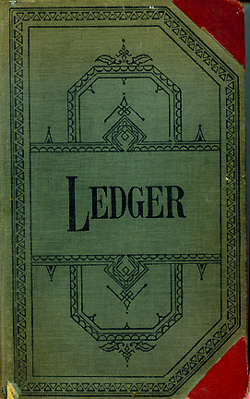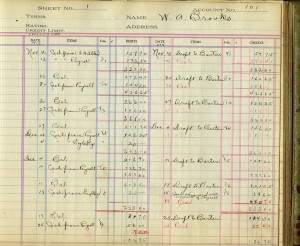This RecordClick genealogist is starting to get out and about searching… searching. Spring is in the air. Heavy winter coats are going away and this past week I saw one. “They are out there,” I keep telling other family historians. “They are really out there – yes they are.”
The look I get is often something between “What are you talking about?” and “Yeah, right.”
This home of this genealogist is in a rural county in eastern Nebraska. There are lots of them out there, though. I just know it.
What is “it”?
“It” is a ledger. Often, it is an elusive ledger.
The ledger was originally purchased and created because someone felt a need to record or keep track of something. What was recorded can delight any genealogist. A family member with a sense of duty could have purchased a ledger to note births. Or one to record marriages. And maybe the deaths in a household. A business owner may have tracked purchases, who ran a bill and when those bills were paid. A ruling board in a village or town, long gone, probably had one to keep track of assets and expenditures. The list is limited only by the imagination of a genealogist or anyone else.
The ledger that this genealogist saw, recently, was purchased for the princely sum of 50 cents in about 1910. It doesn’t look like anything exceptional on the outside. The cover is worn but still in decent shape. BUT on the inside, for a genealogist looking for a specific piece of ancestry information, this ledger is the source of a wonderful amount of information about a small town cemetery. It even includes the scraps of paper with handwritten notes.
This particular cemetery was the site of burials for over 40 years when, in 1910, a group of individuals decided that records needed to be kept concerning the cemetery. The grass and trees needed to be tended. Tombstones needed to be looked over. Plots had to be sold. A board was formed. Minutes of activities were recorded. A budget was set.
There were names – lots of names in the ledger. Some of the names pertained to the deceased. Other names were of those who took care of the deceased.
I only skimmed the ledger. And right away, one of my family names stood out. The individual had been born in the area, grew up there, left for a couple of years, returned and settled there. He was farming when he died at age 43, in 1920. I have various records and newspaper clippings for him. But there he was, listed in the ledger as a board member for the small town cemetery. For a genealogist, this can be way cool and may even warrant a happy dance.
The information added a dimension to this individual that this genealogist hadn’t known before. He was a respected member of the community or he wouldn’t have been a part of the cemetery board. By wanting to see that the place where they were buried was neatly maintained, this genealogist learned that he had cared about those who had gone before.
For my family history research, I intend to take a closer look at the ledger.
Is this ledger unique? No. There are lots of them out there. Sometimes the individuals in charge of them know what they are. Sometimes they are just an old book with names and writing in them. Are they online? No. Will they ever be online? Maybe. Maybe not. Sadly, many are gone. On the bright side, many are still around. A good genealogist needs to be able to put on some walking shoes and go looking for them.
To the owners of an old ledger: If you don’t know what to do with it, contact a local historical society, genealogical society or local library. These books provide unique historical information about an area. They help us learn about the people who created that history. The repositories that specialize in historical documents can keep them safe.
Finally, these ledgers are what a genealogist and other historical researchers call a primary source. They contain original information created at the time of the event. For the family history researcher, they are the ultimate find. In a cemetery ledger, if there is no tombstone, there may be a record of a burial. In a business ledger, it may prove that an ancestor was in a certain place at a certain time, what was purchased and if bills were paid. For ancestry researchers, these wonderful elusive ledgers are often found in the area where ancestors lived.
A genealogist from RecordClick will locate where your ancestors lived and recover the hard-to-find information. Our genealogists for hire will find illusive ancestors and documents such as adoption, custodial and other court records for you and your family.








